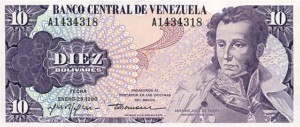Last week we looked at our inflation, now we will take a looks at what hyper inflation looks like for one of our neighbors to the south. The price of oil has affected many economies around the world. It has hurt our economy in many ways, and helped in many other ways. But our economy is we diversified which is why the low price of oil has had such a balancing effect in our economy - other countries are not so blessed.
One major oil exporter, Venezuela, is particularly hurting because of the low oil prices. As oil became the main income source, the country began to ignore other industries, like agriculture, and thus requires most of their food to be imported from Columbia and the United States. 
Before the 1950s agriculture was greater than 50 percent of Venezuela’s GDP, now it accounts for approximately five percent of GDP. This is a serious problem for the country’s leadership. As oil prices drop they are truly hurting. Its like still needing to feed the family on half the income; some things you can no longer afford and you don't have the economic base to find the income from other sources.
With oil exports accounting for over 95% of Venezuela’s revenue, the 50% collapse of oil prices in the past two years has thrown the country into fiscal and political turmoil. In order to raise critical cash to keep the government operational, officials have started to sell the country’s gold reserves.
Even though the country is a major exporter of oil, it is also a major importer of essential goods for its citizens. The country’s currency, the bolivar, has collapsed to the value of one U.S. cent, creating hyperinflation which led to prices soaring over 121% in 2015, and expected to rise nearly 500% in 2016, as estimated by the IMF.
Inflation of this magnitude is similar to having a massive heart attack after twenty years of high blood pressure! It can really kill an economy!
In addition to its fiscal woes, the country is also suffering from little rain, which has brought about severe electricity shortages due to its main source of power generation, a dam whose water levels have dropped to historical lows. In late April, the country’s president ordered a two-day work week for government employees, in order to stem the consumption of electricity. The government workweek now is down to Mondays and Tuesdays, affecting roughly 2.6 million employees, representing 20% of the nation’s workforce.
Economic conditions have worsened, as the economy shrank 5.7% in 2015 and is projected to shrink another 8% in 2016, as estimated by the IMF. Such dire circumstances have created concern among U.S. officials, which are increasingly worried about an unraveling socialist economy and a political meltdown. Such an occurrence could lead to social unrest, chaos and political instability, causing tensions to rise with neighboring countries in South America.
So why is this important? Well hopefully two reasons: 1. perhaps it will bring about a political change, which will move the country back to a democracy and a free market economy and away from its current socialist/communist government. 2. hopefully they will begin to expand their industrial base and grow into other industries besides oil. Any time an economy is based on a single product the risk goes way up for future economic troubles.
Additionally, it would be great for our two countries to get along better - geographically we are very close to Venezuela (less than 1400 miles) and the several people I know from Venezuela are wonderful people!
Sources: IMF
Remember:
There are plenty of good five cent cigars in the country. The trouble is they cost a quarter.
Franklin Pierce Adams



